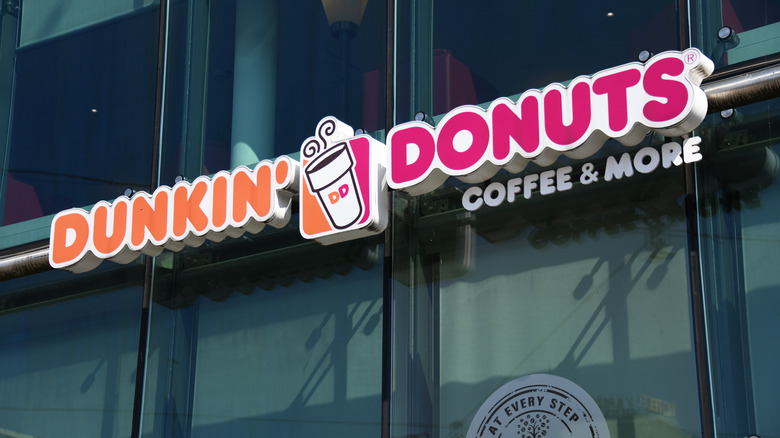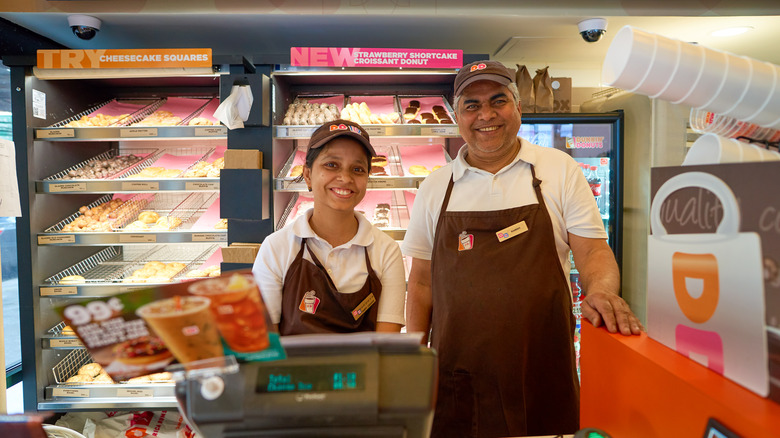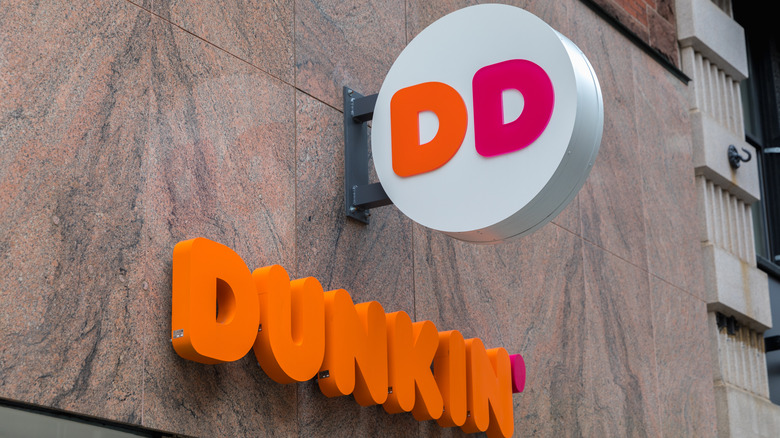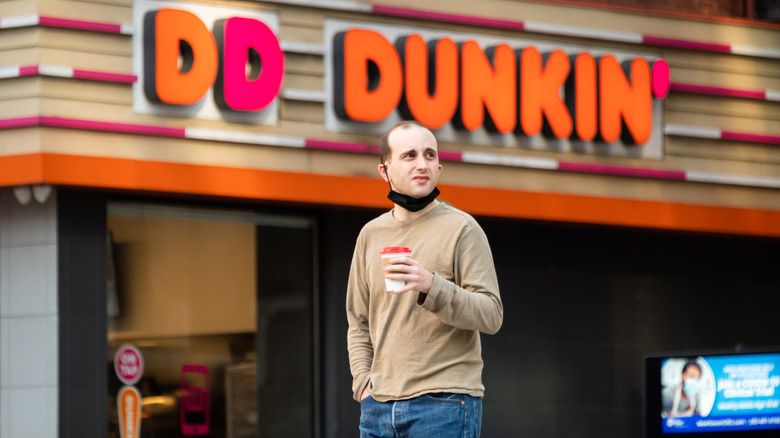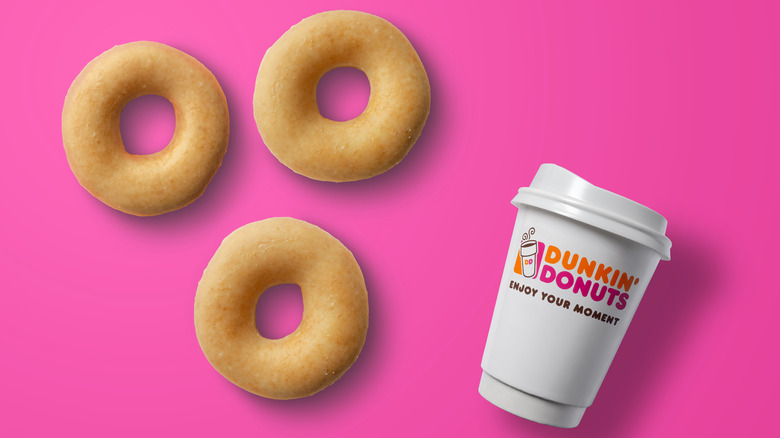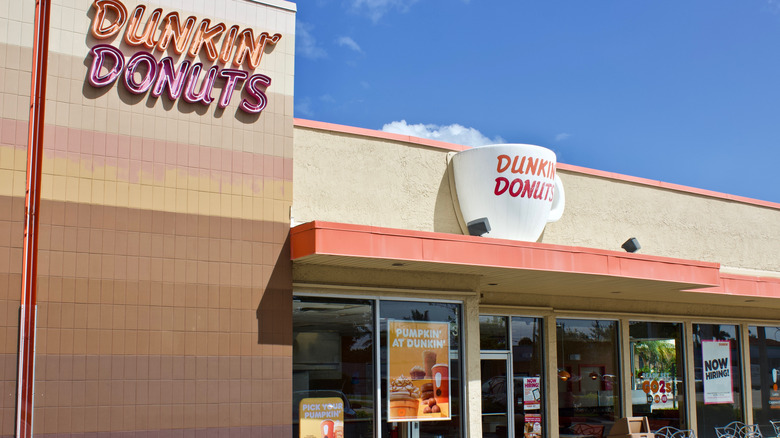The Untold Truth Of Dunkin' University
We may receive a commission on purchases made from links.
If we told you that Dunkin' University existed, how quickly would you pull up those transfer papers? Unfortunately, it's not that easy to become a student.
Also known as Dunkin' Brands University, the trade school is located in Braintree, Massachusetts, according to Merrill. By the time employees "graduate" after six weeks of intense coursework, they will be skilled in everything from frying doughnuts to the equipment they are made on, according to a Chicago Tribune article.
Despite not being very publicly known, the university was founded in 1966 and has graduated many classes since that year. So what exactly does one learn at Dunkin' University that can't be taught in a quick, onboarding session? Well, by the end of their time at the institution, employees are masters of doughnut production and craftsmanship. And we're about to tell you exactly what they learn in the duration of those six busy, but meaningful, weeks as students.
It's a combination of online and in-person training
Dunkin' University was already ahead of the online learning trend prior to the coronavirus pandemic — it has a digital portal students can log into. According to TrainingDone, the website is powered on an LMS software technology called Skillport developed in 2003.
Once logged in, students have access to classes about food and beverages preparation, as well as customer services operations. Employees can reference this portal at any time from anywhere in the world, if needed, making it a very useful training tool.
On the other hand, Dunkin' Brands University is an in-person institution owned by the popular coffee chain. It is located just outside of Boston and only required for Dunkin' Donuts operators.
In addition, according to Franchise Direct, at least two individuals of the Dunkin' Donuts restaurant must also partake in the Dunkin' Brand training program. This does not include the in-person training at Dunkin' Brand University or lessons via the online portal.
The in-person site is in Braintree, Massachusetts
As touched on before, the in-person facility is located in Braintree, Massachusetts. This is not far from Quincy, Massachusetts, where the first restaurant was established, according to Dunkin' Donuts History.
Dunkin' Brands University is only required for those who actually operate a Dunkin' chain, but anyone can attend if they hope to manage or own a Dunkin' restaurant in the future, according to the Chicago Tribune.
Because of the rule that mandates all Dunkin' operators to attend at one point, the university attracts many international students from as far as Japan and Thailand. This makes sense, as Dunkin' has locations in 36 countries, according to the chain's website. Besides honing their doughnut making skills, students don't have much to lose financially. According to the Chicago Tribune article, the course is free, but all students need to cover their housing and travel expenses.
After working nine-hour shifts for six weeks straight, graduates then become professionals in the art of crafting doughnuts through hands-on labs and activities.
Students are graded on performance in the kitchen
Passing the course at Dunkin' Brands University is no easy feat — you'll be judged on your doughnut producing capabilities. Owning a Dunkin' chain may come with the misconception that the operator will be buying premade doughnuts from a supplier, but nonetheless, knowing how to make doughnuts from scratch is a requirement, according to The Patriot Ledger.
In addition, there will be frequent quizzes, and students are required to pass at least two each week, according to the Chicago Tribune. Furthermore, the final assignment is to make 140 dozen doughnuts and to fill an entire room with them in a span of eight hours. The doughnuts will then be judged on their weight, size, and taste. We're getting extreme Cake Boss vibes here.
Some other grading criteria include assessing the students' problem-solving and managerial skills. All these factors are responsible for a student's final grade, and according to the Chicago Tribune, 4% of an enrolled class do not pass.
There is a tight structure around the in-person course
Being able to ace a test is one thing, but putting in the work for six weeks straight is something else. According to an article by The New York Times published in 1988, the program's layout is very structured. There is a lecture component that primarily consists of videos, and students must memorize facts such as the temperature used to bake the pastries. In addition, the homework isn't something you can cram in right before class, with students stating that it takes them an average of two hours to complete assignments for the day.
Wicked Local also provides an overview of Dunkin' University's syllabus, which includes a "Coffee Excellence" component that assesses a student's knowledge of coffee beans and a "Point of Scale" lesson, with three sessions dedicated to management. This section includes more analytical skills, requiring program attendees to be competent in managing a team of employees and using chain-wide financial tools.
It isn't the only restaurant training program
There are plenty of other chain restaurants that make an effort to be sure that its employees are properly trained, including Five Guys University. Like Dunkin' University, Five Guys University consists of both an online and an in-person component, but allows its employees to decide the learning model suited best for them. The courses at FGU are similar as well, including customer service classes and food preparation lessons.
Though it's less extensive, KFC makes its employees go through a series of training lessons, including a virtual escape training room in which they learn how to make the company's famous fried chicken recipe, according to Panopto. This training program is the perfect combination of applying learned knowledge to physical experiences, as students are "standing" in a virtual kitchen and learning how to prepare chicken with Colonel Sanders.
In addition, Dunkin' Brands also owned a Baskin-Robbins training center in Burbank, California, according to The Patriot Ledger, but it is uncertain if that facility is still operating today.
